On June 2, 2025, Ukraine and Russia finalised their largest prisoner of war exchange and body repatriation agreement since the conflict’s onset in February 2022, following Turkey-mediated peace talks in Istanbul.
The Ukraine-Russia prisoner swap includes an “all-for-all” exchange of seriously wounded, ill, and young soldiers aged 18-25, alongside returning approximately 6,000 fallen soldiers’ bodies, as reported by Reuters.
Ukrainian Defence Minister Rustem Umerov described the recent deal as a humanitarian breakthrough. It involves the exchange of at least 1,000 prisoners from each side, although the final numbers are still pending verification. Russia’s Vladimir Medinsky suggested a two- to three-day ceasefire in certain frontline areas to enable the recovery of bodies. Umerov highlighted Kyiv’s determination to secure the release of all captives and abducted children while accusing Moscow of refusing to agree to an unconditional ceasefire.
⚡️Ukraine seeks to bring back up to 1,200 people in next prisoner swap with Russia, Zelensky says.
The next prisoner exchange will reportedly include young people between the ages of 18 and 25, as well as people with serious injuries.https://t.co/nxQMzA9NOx
— The Kyiv Independent (@KyivIndependent) June 2, 2025The Istanbul peace talks 2025 occurred amid intensified hostilities, including Ukraine’s June 1 drone strikes on Russian airbases and a Russian missile attack on a Dnipro military base, per Kyiv Independent. Unlike May’s stalled talks, this round achieved significant progress, with Turkey’s mediation pivotal. Kyiv proposed further discussions by late June to sustain momentum.
The body repatriation agreement and the proposed exchange focus on humanitarian priorities, which could help ease tensions. Turkey’s position as a neutral mediator enhances its diplomatic influence. However, Ukraine’s rejection of Russia’s partial ceasefire proposal highlights the ongoing challenges in achieving lasting peace. Turkey’s mediation efforts emphasise the significance of third-party diplomacy in the Ukraine-Russia conflict.






